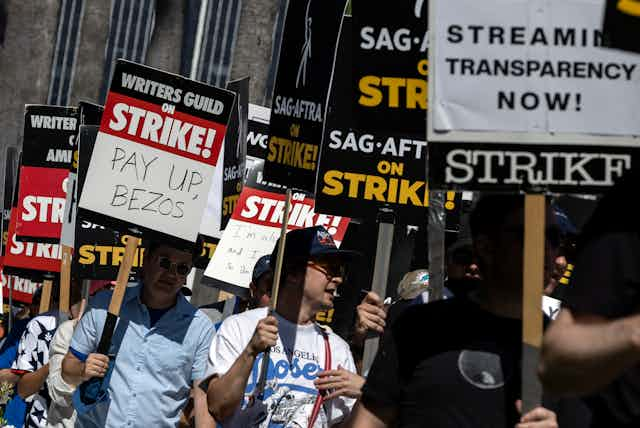You’ve probably heard that Hollywood writers and actors are striking.
One of the main revelations to outside observers is the hard treatment meted out by production companies (in concert with streaming giants) to artists. Even very successful and sometimes famous writers or actors can struggle to make a living wage, with residuals – the money these artists make when their work is re-aired – dropping precipitously in the streaming era.
One of the key reasons the entertainment industry urges us to support copyright and avoid piracy is to support artists. So what happens to our moral calculations when it turns out industries direct so little revenue to creative workers? Should we really feel morally beholden to pay streaming services that exploit artists?
The strike presents a worthwhile moment to think about why we have copyright, and whether it is a law worthy of respect.
Read more: How Ronald Reagan led the 1960 actors' strike – and then became an anti-union president
What is piracy?
Piracy refers to the illegal copying, accessing, downloading, streaming or distributing of another’s created work of entertainment, without transforming that work. (For example, fan fiction often violates copyright, but because it transforms the work, it isn’t piracy.)
Content industries tend to stereotype pirates as rapacious, remorseless thieves. But many pirates pay respect to copyright law’s spirit, if not its black-letter obligations.
Consider four different types of pirates:
- takers take whatever they want without compunction
- samplers pirate only to sample works. Once they find something they enjoy, they purchase it
- finders only pirate works that aren’t otherwise available
- non-payers only pirate works they would never otherwise have purchased (for example, because they do not have the money to pay for it).
These four types of pirates raise different moral concerns, and it can be tricky to tease out the ethics of each. Let’s confine our attention here to taking, which is the most concerning type of piracy.
Is piratical taking of copyrighted works ethical?
Is copyright law morally right?
Perhaps the most obvious question to consider will be whether we agree with copyright. Copyright law has two main moral justifications.
First, copyright might be justified on the basis that it provides incentives to artists to develop their work. The production of new art usually requires significant labour. Without some way of supporting artists for what they do, there would be less art and entertainment for us all to enjoy. This “utilitarian” argument justifies copyright because of its good consequences.
Second, we might think artists deserve to be compensated. If through hard work and talent someone creates something that gives enjoyment and fulfilment to millions, then it seems unfair if they don’t get rewarded. This is a rights-based or desert-based moral justification.
When industry bodies appeal to the need for copyright law to protect and support artists, they are tapping into the moral force of these arguments.
Still, both these justifications are controversial. Reasonable and informed people can disagree with them.
Read more: From convicts to pirates: Australia's dubious legacy of illegal downloading
Understanding legitimacy
Suppose we disagree with a law. Do we have the right to ignore it? There are two good reasons to think we don’t have that right.
First, if people only respected laws they already agreed with, then law itself would cease to function. The main reason we have the rule of law is to avoid everyone simply doing whatever they want.
As political theorists such as John Locke argued, such situations quickly descend to violence, as everyone enforces their chosen understanding of rights and obligations. Lawless societies are not nice places to live.
Second, democratically made laws have a special claim to legitimacy. As human institutions, democracies are inevitably flawed. Yet they provide an important way that everyone in a community can come together as equals and play a role in deciding the laws that will bind them.
These two arguments show we can disagree with a law, but still think it should be respected.
So, should we turn to piracy?
Where, then, are we left when we find that many entertainment industries exploit artists, and that little of the money from our purchases trickles through to the artists who created it?
For a start, we have reason to think that such industry bodies are not just being exploitative. They are also being hypocritical and manipulative when they appeal to artists to persuade us to support copyright.
If they really were morally committed to supporting artists, their own behaviour would reflect this.
The lack of support to artists may also prompt us to rethink how well copyright law really serves the justifications presented for it.
Can we go a step further, and say that if entertainment industries are such exploitative hypocrites, we’re entitled to stop handing over our hard-earned cash to access their shows?
If the above arguments are on the right track, then the answer is “no”.
For one thing, copyright law is still the democratically created law of the land. We wouldn’t want other people dispensing with laws and entitlements we cherish and rely on. So we have reason not to break laws that are important to other people.
More specifically, many artists at least make some money from the present system. If we are morally outraged at how little our purchases contribute to their wages, it would be a wildly inappropriate response to stop paying altogether (and thereby strip our contribution to artists down to zero!).
While we should resist resorting to piracy, the Hollywood strikes do invite us to think critically about how well our current laws live up to their justifications, and whether there are other ways we can support artists.


